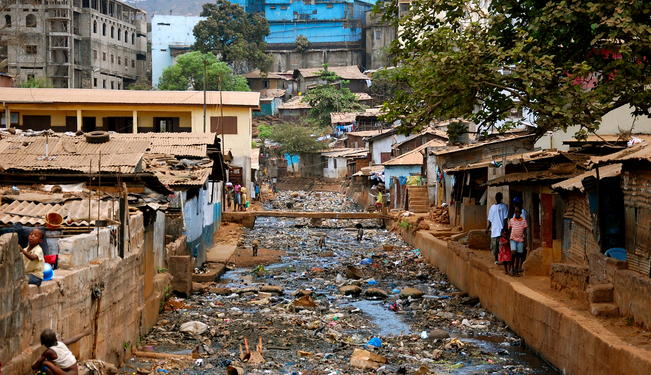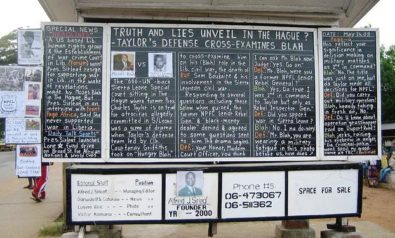The sentence on Charles Taylor is to be pronounced on May 30, 2012, and Sierra Leoneans will finally receive some justice for the atrocities they have endured.
The Civil War
This year’s April was a change‐making month for Sierra Leone and the rest of the world. For the first time since the aftermath of World War II, a former head of state was indicted and found guilty of war crimes. The Special Court for Sierra Leone convicted Charles Taylor of crimes against humanity: murder, rape, sexual slavery, and conscripting child soldiers in Sierra Leone’s bloodstained and decade‐long civil war. Nicholas Koumjian, a lawyer at the UN‐backed court said, “this is a historic moment.”
When the Revolutionary United Front (RUF) started their attacks on the Liberian border in 1991, one of the bloodiest civil wars in the past 20 years was initiated.
Although Charles Taylor never set foot on Sierra Leonean soil during the 1991‐2002 civil war, it seems like the former Liberian president was one of the main orchestrators of the war, providing the rebels with essential aid. Driven by his desire to access the rich diamond mines in the country’s eastern provinces, he supplied the rebels with arms and cash which abetted the forces’ campaign of terror. Known for their cruel atrocities against civilians, the RUF were infamous for rape, forced child recruitment, and amputations. These ferocious particularities hardly touch on the full range of violence that was unleashed on innocent civilians during this time.
Being underequipped, badly trained, and sometimes simply lacking the will to fight for a corrupt and unorganized government, the Sierra Leonean army struggled to cope with the attacks. The west African country was only able to free itself from the 12 years of violence with the assistance of international forces. The civil war has carved deep scars into Sierra Leone’s society, which will take generations to heal before the shadow of past carnage can be forgotten. Some 72,000 ex‐combatants needed to be disarmed and demobilized, although many are still awaiting reintegration assistance. Furthermore, many young boys and girls that were forcefully involved in the war, were ostracized and expelled from their communities.
The Government, Foreign Aid, and Business in Sierra Leone
The establishment of the Truth and Reconciliation Commission (TRC) examined the root causes of the conflict and made recommendations to avoid a relapse. This, and the Special Court for Sierra Leone’s (SCSL) legal proceedings against a number of suspected war criminals, was one of the first steps to facilitate genuine reconciliation between victims and perpetrators. In 2005 the government of Sierra Leone issued a White Paper as a reaction to the TRC’s Final Report. Therein it only accepted some of the Commission’s recommendations and thus has been harshly criticized by members of civil society groups for being too vague and for not following the reports’ advice.
While improvements have been made, most citizens still face a daily struggle for survival. The Human Development Index lists Sierra Leone as 180 out of 187, and the average life expectancy is just 48 years. Even the eight countries listed behind Sierra
Leone, such as the Democratic Republic of Congo and Burkina Faso, have a higher life expectancy. The gross national income per capita is $737,but income inequality is high and the majority of people live in extreme poverty.
Sierra Leone has all the potential to become a rich country. Having large deposits of valuable mineral resources such as diamonds, gold, and iron ore, and all the ingredients necessary for productive agriculture, Sierra Leone was one of the states with the most promising futures ahead when it gained independence from Great Britain in 1961. However, the poorly diversified economy, underdeveloped infrastructure, weak education system, lack of markets, and weak capacity to manage these resources for the benefit of all its citizens, mean that its full potential is currently unexploited and most likely will remain untapped for some time to come.
The main issues standing in the way of Sierra Leone’s future development continue to be persistent poverty, youth unemployment, and corruption, which are ultimately hindering the development of prompt social services. The corruptions index of Transparency International, lists Sierra Leone at number 134 out of 182 countries.
Compared to the devastating place it holds at the Development Index, this may not sound too bad, but for everyday life, this is the factor that weighs them down the most.
Never knowing if services will be provided or how high the ‘service charge’ will be, the people’s mistrust of the local authorities is one of the immediate effects. Targeting corruption and malfeasance, Western aid providers agreed on basing their cooperation on good governance and institutional support as well as the rehabilitation of priority infrastructure. But, at the same time, they are protecting their interest and a mismanaged, corrupt government is simply easier to control. On the one hand, the foreign aid and assistance is helping the country to improve its situation, but at the same time, so much more could be done.
Enforcing proper taxation on the country’s produced goods and resources, is the first thing a proper government that acted in its citizen’s interests would do. According to an October 2011 report by DanWatch, even though more than half of Sierra Leone’s export revenue in 2010 came from the mining industry, the government’s revenue that same year from the mining sector was less than 10%. Just one out of the five largest mining companies is actually paying corporate income tax, and this too only for a meager percentage of the market value of its exports. Due to corruption and malfeasance, the ruling APC government of Sierra Leone is not able to negotiate mining contracts, which keeps them from establishing an economic system favorable to the people, who are being short‐changed by their own government and by foreign investors.
The Everyday Struggle
Many people left their hometowns in order to seek shelter from the horrors of war and of these, many remained in Freetown, hoping to find a better future in the city after the end of the war. High unemployment rates –throughout the country and especially in the overpopulated capital Freetown – sometimes leave people with no other choice but to hang around spots highly frequented by foreigners and other wealthy people in order to get some money for watching or washing parked cars or just by begging. Sadly enough, even young children that are passing by will reach out to strangers for food or money.
With no access to water, sanitation, or electricity throughout much of the country, people struggle just to survive. Individuals have become desensitized to death and most do not have the luxury of dedicating time to the remembrance of the past. The school curriculum does not even teach the root causes and facts behind the decade-long war, which caused many of Sierra Leone’s current problems. It feels as if a veil of silence has been drawn over the precedent events. Only small elements, such as the Okada riders – unemployed young men, who are mainly ex‐combatants and now make a living by conveying passengers on cheap UN-supplied motorcycles – recall Sierra Leone’s bloody past.
Even though the mention of Charles Taylor still stirs strong emotions in many people’s minds, for most Sierra Leoneans, the war and the trial are now in the past. They are now more concerned with the forthcoming presidential election. Furthermore, the fact that the Taylor trial has taken place in The Hague rather than in Freetown, unlike the earlier special court prosecutions, has also distanced it from public consciousness.
Still, the 30th of May 2012 will be an important day for Sierra Leon
Support Fair Observer
We rely on your support for our independence, diversity and quality.
For more than 10 years, Fair Observer has been free, fair and independent. No billionaire owns us, no advertisers control us. We are a reader-supported nonprofit. Unlike many other publications, we keep our content free for readers regardless of where they live or whether they can afford to pay. We have no paywalls and no ads.
In the post-truth era of fake news, echo chambers and filter bubbles, we publish a plurality of perspectives from around the world. Anyone can publish with us, but everyone goes through a rigorous editorial process. So, you get fact-checked, well-reasoned content instead of noise.
We publish 2,500+ voices from 90+ countries. We also conduct education and training programs
on subjects ranging from digital media and journalism to writing and critical thinking. This
doesn’t come cheap. Servers, editors, trainers and web developers cost
money.
Please consider supporting us on a regular basis as a recurring donor or a
sustaining member.
Will you support FO’s journalism?
We rely on your support for our independence, diversity and quality.






